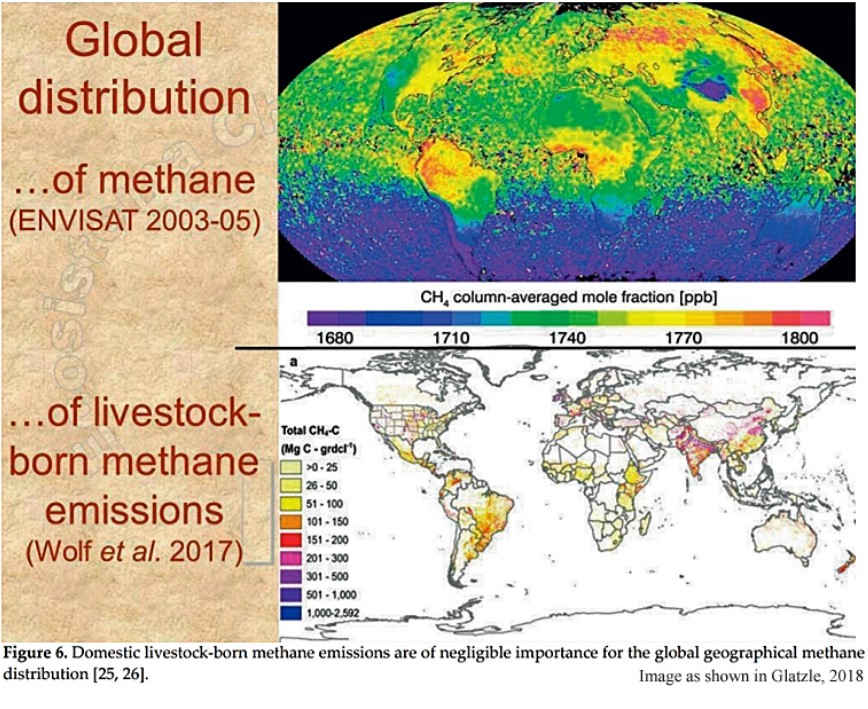Table of Contents
Good news from a paper by a scientific expert agrobiologist and researcher Dr Albrecht Glatzle. His recent published research that shows “there is no scientific evidence, whatsoever, that domestic livestock could represent a risk for the Earth’s climate”
The key points from this research as set out at NoTricksZone are:
“In order to get the effective man-made part of the emissions from managed ecosystems, one has to subtract the baseline emissions of the respective native ecosystems or of the pre-climate change managed ecosystems from those of today’s agro-ecosystems. Omitting this correction leads to a systematic overestimation of farm-born non-CO2 GHG emissions. Scientific publications generally do not take this consideration into account, as farm-born CH4 and N2O emissions are consistently interpreted at a 100% level as an additional anthropogenic GHG source, just like fossil fuel-born CO2.
“Dung patches concentrate the nitrogen ingested from places scattered across the pasture. Nichols et al. [2016] found no significant differences between emission factors from the patches and the rest of the pasture, which means the same amount of nitrous oxide is emitted whether or not the herbage passes livestock’s intestines. However, the IPCC and FAO do consider mistakenly all nitrous oxide leaking from manure as livestock-born and therefore man-made.”
“Between 1990 and 2005, the world cattle population rose by more than 100 million head (according to FAO statistics). During this time, atmospheric methane concentration stabilized completely. These empirical observations show that livestock is not a significant player in the global methane budget [Glatzle, 2014]. This appreciation has been corroborated by Schwietzke et al. [2016] who suggested that methane emissions from fossil fuel industry and natural geological seepage have been 60–110% greater than previously thought.”
“When looking to the global distribution of average methane concentrations as measured by ENVISAT (Environmental Satellite) [Schneising et al., 2009] and the geographical distribution of domestic animal density, respectively [Steinfeld et al., 2006], no discernible relationship between both criteria was found [Glatzle, 2014].”

“Although the most recent estimates of yearly livestock-born global methane emissions came out 11% higher than earlier estimates [Wolf et al., 2017], we still cannot see any discernible livestock fingerprint in the global methane distribution.”
“The idea of a considerable livestock contribution to the global methane budget relies on theoretical bottom-up calculations. Even in recent studies, e.g., [Mapfumo et al., 2018], just the emissions per animal are measured and multiplied by the number of animals. Ecosystemic interactions and baselines over time and space are generally ignored [Glatzle, 2014]. Although quite a number of publications, such as the excellent most recent FCRN report (Food Climate Research Network) [2017], do discuss extensively ecosystemic sequestration potentials and natural sources of GHGs, they do not account for baseline emissions from the respective native ecosystems when assessing manmade emissions of non-CO2 GHGs from managed ecosystems. This implies a systematic overestimation of the warming potential, particularly when assuming considerable climate sensitivity to GHG emissions.”
“[W]e could not find a domestic livestock fingerprint, neither in the geographical methane distribution nor in the historical evolution of the atmospheric methane concentration. Consequently, in science, politics, and the media, climate impact of anthropogenic GHG emissions has been systematically overstated. Livestock-born GHG emissions have mostly been interpreted isolated from their ecosystemic context, ignoring their negligible significance within the global balance. There is no scientific evidence, whatsoever, that domestic livestock could represent a risk for the Earth’s climate.”
“[E]ven LA Chefs Column [Zwick, 2018], in spite of assuming a major global warming impact of methane, came to the conclusion: ‘When methane is put into a broader rather than a reductive context, we all have to stop blaming cattle (‘cows’) for climate change.’”
NoTricksZone
Question to James Shaw: Is your position based on science?
Question to Todd Muller: Will you be defending the Kiwi farmers?





